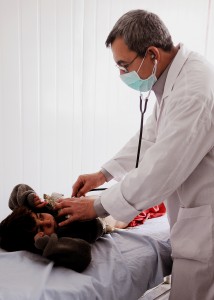
ADHD (Attention Deficit Hyperactivity Disorder) is defined on WebMD as “inattention and/or hyperactivity and impulsivity” which is “inappropriate for the child’s age.” The disorder can have a strong effect on a child’s habits and behavior. It can make it difficult for him or her to concentrate, to stay still, or to check impulses.
It’s easy to imagine how a this condition can lead to havoc in a classroom. Children with ADHD may be frequently scolded for not paying attention to the teacher, for fidgeting, or for spontaneously engaging in acts that disrupt the lesson. ADHD causes these behaviors to occur naturally and much frequently than they do in other children. When healthy kids are told to stop “acting out” or causing a disturbance, they are able to stop. For children with ADHD, it is extremely difficult and sometimes impossible to ignore their inclination to drift off or move around.
How do you know if a child or adolescent really has ADHD? Unfortunately, some are incorrectly diagnosed with the condition. Here are some health problems with symptoms that can mimic those of ADHD.
Childhood Absence Epilepsy (CAE)
CAE is seen in children from ages three to nine. The disorder is characterized by a sudden loss of awareness or lack of attention. During this time, the child may appear to be daydreaming. He or she may stop in the middle of something and stare vacantly into the distance. While this may be interpreted as the inattentive form of ADHD, it’s actually a mild seizure. According to an article on the condition, a child with CAE may also exhibit “rapid eye blinking, head nodding or subtle extremity twitching.” In some cases, the child’s eyes may roll back.
When the brief seizure subsides, the child will usually resume his or her previous activity. An absence seizure, also called a “petit mal” seizure, can be ended abruptly by physical interference. Epilepsy.com explains that the absence seizure is so short and sudden that the child may be unaware of what has just taken place.
Central Auditory Processing Disorder (CAPD)
Described as a rare condition, CAPD causes children to struggle with separating speech from outside noise. A boy or girl with the disorder may feel incapable of focusing because of the distraction caused by other noises while someone is speaking. This makes it a challenge to follow instructions and be attentive in school. An audiologist can diagnose a child with CAPD because it is related to hearing processes in the ear and in the brain.
Avoiding a Misdiagnosis
While it is the responsibility of the doctor or mental health specialist to diagnose your child, there are still things you can do as a parent to help. Make sure to gather as much information as you can about your child’s behaviors, and try to pay close attention to how he or she responds to correction. The more you know about ADHD and the illnesses that mimic it, the better your chances of getting the appropriate treatment for your child.





